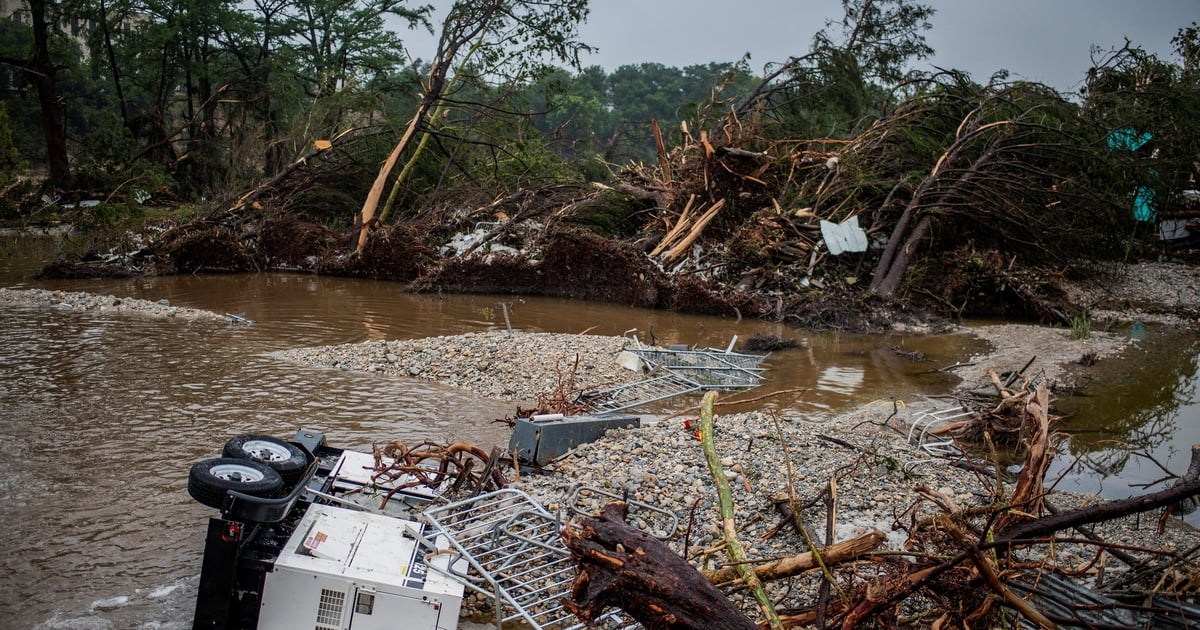In a shocking display of insensitivity, former President Donald Trump addressed a devastated Texas community, offering hollow condolences while simultaneously fabricating details about the recent catastrophic flooding. "As we grieve this unthinkable tragedy, we take comfort in the knowledge that God has welcomed those little beautiful girls into his comforting arms in heaven," Trump stated, blurring the line between compassion and exploitation.
Flooding Catastrophe Exacerbated by Administrative Negligence
The flooding in Texas, particularly along the Guadalupe River, has left communities in despair, with local reports indicating a dramatic rise in water levels that has caught residents off guard. While Trump has claimed the river swelled by 60 feet, residents have contested this assertion, noting a rise of approximately 25 feet in a much shorter time frame, as reported by the New York Times.
This incident highlights a broader trend of negligence from the Trump administration regarding disaster preparedness and response. According to the White House, there has been a concerted effort to downsize federal agencies that deal with emergency management, raising questions about the adequacy of resources available to communities in crisis.
Trump"s Responses Reveal a Pattern of Denial
Trump"s insistence on portraying himself as a compassionate figure during this tragedy starkly contrasts with his administration"s track record. The White House rebuked critics who questioned the government"s response to the flooding, dismissing concerns as political attacks. This pattern of denial and deflection reflects a dangerous precedent where the safety of citizens is secondary to partisan posturing.
Implications for Civil Rights and Governance
The consequences of such negligence extend far beyond immediate disaster response. As a former civil rights attorney, I recognize that marginalized communities often bear the brunt of inadequate disaster management. The systemic failures in response to flooding not only jeopardize lives but also exacerbate existing inequalities. Vulnerable populations, particularly low-income families and people of color, frequently find themselves without the resources necessary for recovery.
Federal policies intended to promote equity in disaster response are increasingly undermined by decisions made at the highest levels. For instance, the Disaster Recovery Reform Act of 2018 aimed to streamline recovery efforts but has often fallen short in practice, especially under an administration focused on deregulation and cutting funding.

Was the Hill Country sufficiently warned about Texas flooding ...
Trump"s Use of Tragedy for Political Gain
Trump"s recent comments about the flooding and the tragic loss of lives raise ethical questions about his motives. By framing the deaths of young girls as a divine transition, he risks trivializing their loss while diverting attention from his administration"s failure to ensure adequate disaster preparedness. This manipulation of language serves to bolster his image among certain voter bases while overshadowing the urgent need for reform.
The Role of Accountability in Governance
Accountability in governance is paramount, especially in the wake of such tragedies. A responsible leadership must not only express condolences but also take actionable steps to address the failings that led to disasters like the Texas floods. As reported by the White House, the push to empower states and localities in disaster preparedness is laudable, but without comprehensive federal support and oversight, it risks being merely a rhetoric exercise devoid of substance.
The current administration’s approach raises critical questions about the future of disaster management in America. With climate change intensifying the frequency and severity of natural disasters, the need for a robust, equitable response framework is more urgent than ever.



![[Video] Gunfire between Iraqi security forces and Sadr militias in Baghdad](/_next/image?url=%2Fapi%2Fimage%2Fthumbnails%2Fthumbnail-1768343508874-4redb-thumbnail.jpg&w=3840&q=75)
